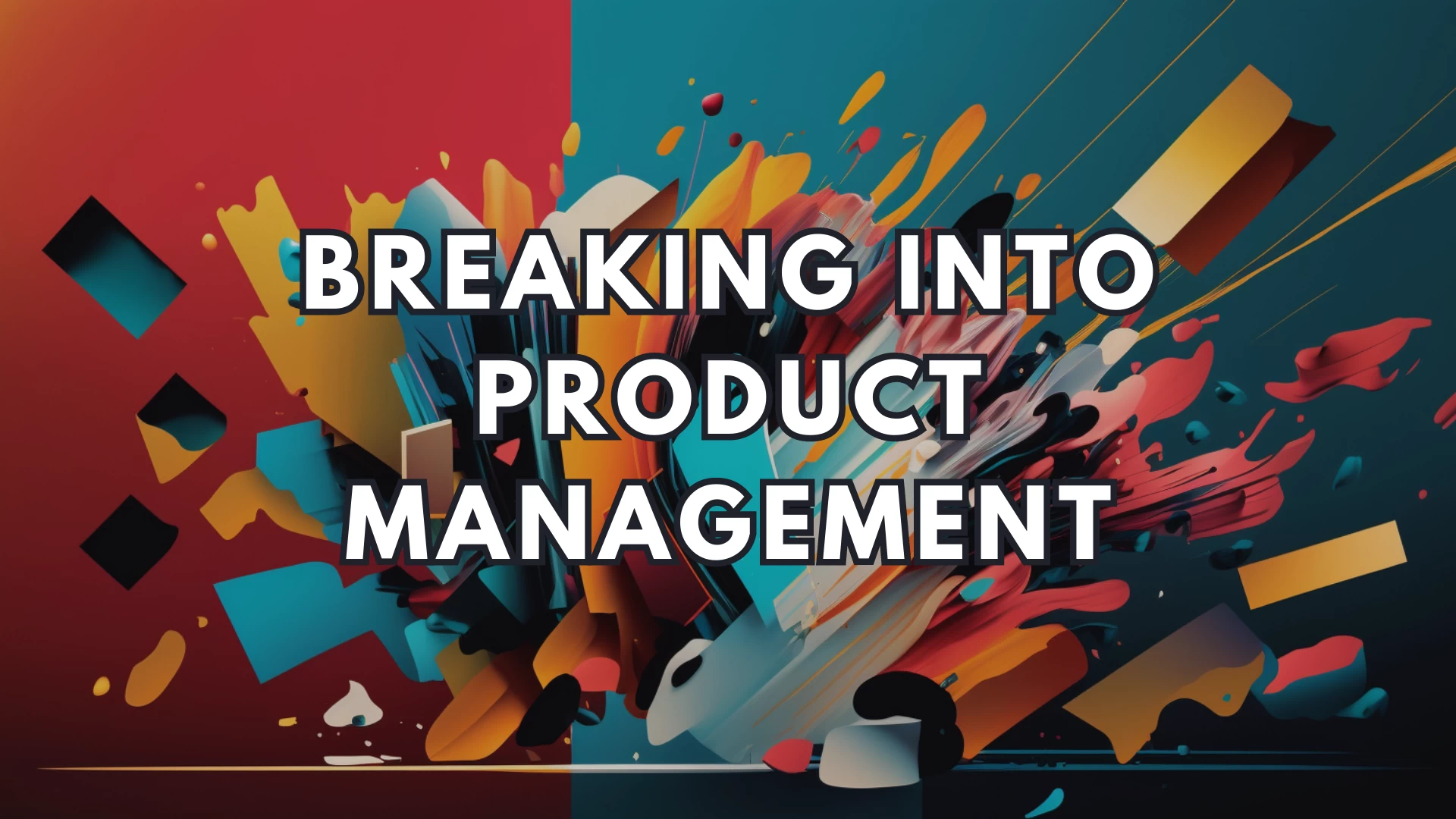Mar 13, 2023
Breaking Into Product Management

Product management is a key role in modern companies, especially medium-sized startups, where PMs drive the development of products that meet customer needs and achieve business goals. For those new to tech or product roles, breaking into product management can seem daunting, but it's entirely possible with the right approach.
Understanding Product Management
Product managers oversee the product lifecycle from ideation to launch and beyond. They collaborate with engineering, design, marketing, and sales teams, while focusing on customer needs, market trends, and business objectives. Unlike project managers who focus on executing plans, PMs shape the vision and roadmap for the product itself.Essential Skills and Qualities
Successful PMs share these traits:- Strategic Thinking: Developing visions aligned with business goals and market trends.
- Communication: Articulating product goals and working with diverse teams.
- Leadership: Motivating and guiding teams toward shared objectives.
- Empathy: Understanding customer pain points and stakeholder needs.
Building these skills involves reading, attending industry events, taking online courses, and seeking mentorship. Hands-on experience, even through volunteer projects, strengthens your understanding of product work.
Overcoming Challenges
Beginners often struggle with confidence and a clear understanding of the role. To combat this, conduct thorough research and connect with product managers through events or online communities. Explore resources like books, webinars, and industry blogs to build foundational knowledge.Distinguishing Product Management from Related Roles
- Project Management: Focuses on execution rather than product vision.
- Software Engineering: Develops the technical infrastructure under PM guidance.
- Design: Crafts user interfaces and experiences, working closely with PMs to meet customer needs.
Tools and Techniques
Common PM tools include:- User Research: Gather feedback to inform product decisions.
- Market Analysis: Stay competitive by studying trends and rivals.
- Prioritisation Frameworks: Decide what features to build next.
- Alignment Tools: Use frameworks like SCQA or Product Strategy Canvas to align roadmaps with business goals.
Practice these skills by running small-scale research projects, following industry trends, and using prioritization exercises to simulate real-world decisions.
Networking and Mentorship
Networking accelerates your path to product management. Join product communities on LinkedIn or other platforms, attend meetups, and seek out experienced PMs willing to mentor. Approach mentorship with a growth mindset, ready to receive feedback and apply lessons to your journey.Next Steps
Pursuing a product management career requires patience and deliberate effort. Research, skill-building, and networking create a foundation for success. Whether you're transitioning from another role or starting fresh, the right mindset and strategy can help you land a product management role and excel in the field.As technology continues to reshape industries, product management has become a crucial role in many companies, particularly in the context of medium-sized startups. Product managers (PMs) are responsible for guiding the development and delivery of products that meet customer needs and drive business growth.
I will provide practical advice and insights on how to break into product management for those who have never worked in tech or product management before.
Understanding the Role of a Product Manager
Before going into the skills and experiences required for product management, it is important to understand the role itself. Product managers are responsible for overseeing the entire product development process, from ideation to launch and beyond. This involves collaborating with cross-functional teams such as engineering, design, marketing, and sales, and working closely with customers to identify their needs and pain points. PMs must have a deep understanding of the market, the competition, and the company's goals and strategies to develop and execute a product roadmap that aligns with business objectives.Skills and Qualities of a Successful Product Manager
To be successful in product management, there are several key skills and qualities that are essential. Firstly, strategic thinking is critical for a PM as they must be able to develop a product vision that aligns with business objectives and market trends. Communication is also essential as PMs need to collaborate with cross-functional teams and clearly communicate the product vision and roadmap. Strong leadership skills are also important as PMs need to motivate and guide teams towards achieving product goals. Finally, empathy is crucial as PMs must be able to understand the needs and pain points of customers and stakeholders.Developing these skills can be done through a variety of means. Reading books, attending webinars or conferences, and taking online courses can help build knowledge and understanding. Additionally, seeking out mentorship or volunteering for product-related projects within one's current organisation can provide valuable experience.
Challenges Faced in Breaking into Product Management
One of the biggest challenges for beginners in product management is not fully understanding the role itself. This can lead to a lack of confidence when pursuing opportunities in the field. Additionally, without a mentor or prior experience in product management, it can be difficult to know how to develop the necessary skills and gain the required experience.To overcome these challenges, it is important to start by conducting research into the role and seeking out mentorship opportunities. Joining product management communities on social media platforms, attending industry events, and connecting with current product managers can provide valuable insights and advice.
Product Management vs. Project Management, Software Engineering, and Design
Product management is often confused with project management, software engineering, or design, but they are distinct roles. While project managers oversee the execution of specific projects, product managers are responsible for the entire product development process. Software engineers are responsible for developing the technical infrastructure of the product, while designers focus on creating the user interface and experience. PMs work closely with these teams to ensure the product meets customer needs and aligns with business objectives.Tools and Techniques Used in Product Management
User research, market understanding, prioritisation, and alignment with the product strategy are all critical tools (such as SCQA Framework and Product Strategy Canvas) and techniques used in product management User research involves gathering feedback from customers to understand their needs and pain points. Market understanding involves analysing market trends and competition to ensure the product is competitive and meets market needs. Prioritisation involves making decisions about which features to develop and when, based on customer feedback, business objectives, and technical feasibility. Alignment with the product strategy involves ensuring the product roadmap aligns with the company's overall strategy and goals.Developing these skills can be done through various means, such as conducting user research studies, attending industry events to keep up with market trends, and practicing prioritisation exercises.
Networking and Finding a Mentor in Product Management
Networking and finding a mentor are critical components of breaking into product management. Connecting with current product managers through LinkedIn or industry events can provide valuable insights and advice on how to break into the field. Additionally, seeking out mentorship opportunities from experienced product managers can help guide one's development and provide support and advice throughout the journey.When seeking out a mentor, it is important to approach the relationship with a growth mindset and be open to feedback and constructive criticism. Mentors can provide valuable guidance on how to develop necessary skills, navigate challenges, and build a successful career in product management.
Do you aspire to pursue a career in product management? I can offer my guidance in comprehending the intricacies of the product management profession and aid you in securing a role in the field. My expertise can help you acquire the necessary skills to thrive in product management.
About Max Antonov
I'm a father of three from Sydney, a Product Director and a Product Coach. I write about product management and run the Product Manager community.
Feel free to reach out: [email protected].
Subscribe to receive digest emails (1 per month).
